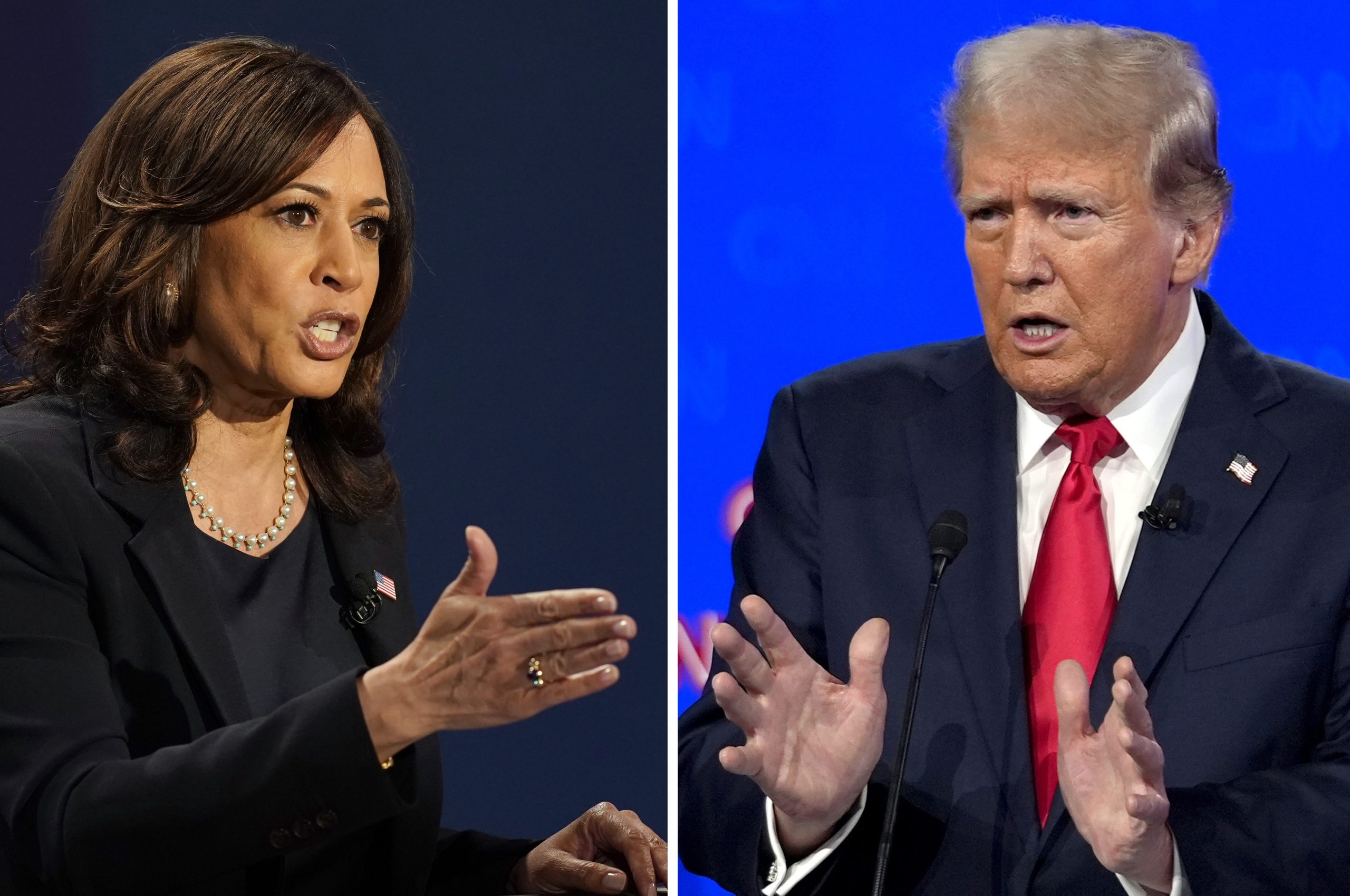Donald Trump has launched a blistering attack on Kamala Harris after she went public with claims about private remarks he allegedly made to her — comments that, according to Harris, were far more flattering than anything he ever said in public.
The clash began after Harris appeared on The View to promote her forthcoming memoir, 107 Days, a book chronicling her short-lived 2024 presidential campaign and the chaotic, bruising race against Trump. In both the book and her TV interview, Harris did not mince words, labeling Trump a “con man” while also revealing that behind closed doors he once told her he planned to “tone it down” because he couldn’t bring himself to attack her harshly.
But if Harris expected Trump to brush off the revelation, she was mistaken. The president swiftly fired back on Truth Social with a signature all-caps rant, savaging Harris as “DUMB AS A ROCK” and demanding an apology for what he called a “total lie.”
Harris’ Memoir: A Candid Look at 2024
Harris’ memoir, 107 Days, details the whirlwind campaign she launched in the summer of 2024, when she sought to revive Democratic hopes in a race many believed was slipping away from Joe Biden. She describes the high-stakes moments, the internal doubts, and her fiery debate exchanges with Trump.
One of the book’s more surprising anecdotes, however, is Harris’ claim about private interactions with Trump. According to her, he told her off-camera:
“How do I say bad things about you now? I’m going to tone it down. I will. You’re going to see.”
For Harris, these words reflected what she calls Trump’s “two-faced” nature — attacking mercilessly in public while offering backhanded compliments in private. In her View appearance, she framed the comments as proof that Trump “knows he’s a con man, and he knows others see through him.”
Her revelation added fuel to already tense political discourse, and it set the stage for Trump’s online eruption.
Trump’s Fury Unleashed
Trump wasted no time. Within hours of Harris’ TV appearance, he blasted out a tirade on his Truth Social platform. In a post dripping with rage, he zeroed in not on the private remarks Harris claimed he made but on her assertion that the 2024 election had been close.
“Kamala Harris, who is DUMB AS A ROCK, is going around and using, as a standard part of her Speech on why she lost the Election, that 2024 was the ‘closest Presidential Election in the 21st Century.’ Everyone knows this is a lie, and was covered as such by Fox News!” Trump wrote.
He went further, declaring that he had won by historic margins:
“I won the Electoral College, 312–226, a LANDSLIDE, Counties Nationwide, 2,600 to 525, a LANDSLIDE, all seven Swing States, a LANDSLIDE, and, despite the fact that California’s Fake Mail In Ballots came in at ridiculous numbers (It was RIGGED!), I still won the Popular Vote by MILLIONS!”
Trump then demanded Harris apologize for what he called “a TOTAL LIE,” signing off with a sarcastic “Thank you for your attention to this matter!”
The Numbers Tell a Different Story
While Trump insists his win was a “landslide,” the data tells a more complicated story. Yes, Trump secured a comfortable margin in the Electoral College, flipping all of the key swing states. But the margins in many of those battlegrounds were razor-thin:
-
Michigan: Trump won by just 1.4%.
-
Wisconsin: Trump edged out a victory by 0.9%.
-
Georgia: The difference was only 2.2%.
In raw numbers, those percentages translate to tens of thousands of votes in states with millions of residents — hardly the kind of overwhelming landslide Trump claimed.
Political analysts quickly noted that while Harris may have exaggerated in calling 2024 “the closest election of the 21st century,” her point about how tight the swing state margins were is backed up by the data.
Harris Strikes Back
Though Harris hasn’t responded directly to Trump’s Truth Social rant, she doubled down during her book promotion tour. Speaking to The New York Times, she argued that Trump’s reaction was “predictable” and only underscored his inability to accept reality.
“He thrives on rewriting history,” Harris said. “He can’t admit vulnerability, so he lashes out. That’s what he did to me in debates, and that’s what he’s doing now.”
She also suggested that Trump’s furious denial avoided the more uncomfortable part of her revelation: his alleged private praise. “He wants to distract everyone from the fact that, behind closed doors, he couldn’t help but let the mask slip,” she said.
A War of Words That Defines an Era
For observers, the exchange between Trump and Harris encapsulates the deeply polarized political climate of the past several years. Trump remains as combative and unapologetic as ever, insisting on his version of the truth and using insults as weapons. Harris, meanwhile, positions herself as a candid critic unafraid to expose behind-the-scenes moments.
Their feud is also part of a broader struggle over the narrative of the 2024 election. Trump wants to cement the idea of his win as decisive, while Harris and other Democrats seek to remind voters how close the race truly was.
This battle over memory and perception is likely to intensify as the 2028 campaign cycle looms. Both figures are expected to play central roles — Trump as the incumbent president seeking to expand his grip, Harris as a high-profile Democrat with unfinished business.
Experts Weigh In
Political analysts were quick to dissect the war of words.
Dr. Lisa Keller, a professor of political communication, noted:
“Trump’s strategy has always been to project strength and certainty, even when the numbers suggest a more nuanced story. Harris exposing his private remarks undermines that image, and his furious reaction shows how sensitive he is to any suggestion of weakness.”
Meanwhile, Republican strategist Mark Thompson argued that Harris’ revelation may backfire:
“Democrats want to paint Trump as a hypocrite, but to his base, this kind of gossip only strengthens their loyalty. They see Harris as petty and opportunistic.”
Still, even some Republicans privately admit that Trump’s repeated use of insults like “DUMB AS A ROCK” risks alienating moderate voters.
What Comes Next
With Harris continuing her book tour and Trump never far from his Truth Social account, the feud shows no sign of cooling.
Harris will likely continue pressing her case that Trump’s public bravado hides private contradictions. Trump, in turn, will hammer away at her credibility while portraying himself as the unshakable victor of 2024.
For voters, the spectacle offers a preview of the ugly battles likely to define American politics heading into 2028. The clash is not just about personal grievances but about control of the national narrative — who gets to tell the story of 2024, and what that story means for the future.
Conclusion
What began as a book promo has turned into yet another political firestorm, with Trump and Harris locked in a bitter exchange that shows no signs of slowing down.
Harris’ revelation of Trump’s private words may not change minds overnight, but it adds a fresh wrinkle to the public’s understanding of their rivalry. Trump’s furious denial, dripping with insults and capital letters, only reinforces the deep divisions of the moment.
One thing is certain: in an era defined by spectacle, neither Trump nor Harris seems willing to back down. And as both position themselves for the battles ahead, voters can expect more revelations, more rants, and plenty more fireworks before the next election cycle truly begins.

Emily Johnson is a critically acclaimed essayist and novelist known for her thought-provoking works centered on feminism, women’s rights, and modern relationships. Born and raised in Portland, Oregon, Emily grew up with a deep love of books, often spending her afternoons at her local library. She went on to study literature and gender studies at UCLA, where she became deeply involved in activism and began publishing essays in campus journals. Her debut essay collection, Voices Unbound, struck a chord with readers nationwide for its fearless exploration of gender dynamics, identity, and the challenges faced by women in contemporary society. Emily later transitioned into fiction, writing novels that balance compelling storytelling with social commentary. Her protagonists are often strong, multidimensional women navigating love, ambition, and the struggles of everyday life, making her a favorite among readers who crave authentic, relatable narratives. Critics praise her ability to merge personal intimacy with universal themes. Off the page, Emily is an advocate for women in publishing, leading workshops that encourage young female writers to embrace their voices. She lives in Seattle with her partner and two rescue cats, where she continues to write, teach, and inspire a new generation of storytellers.









